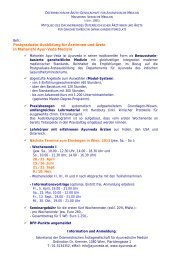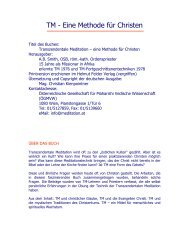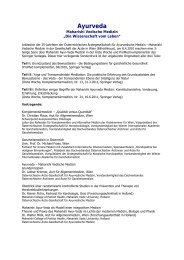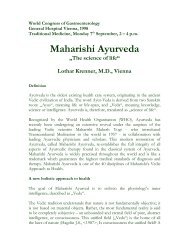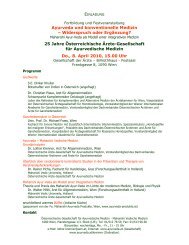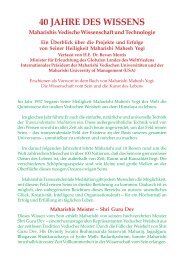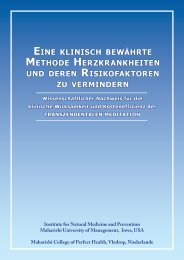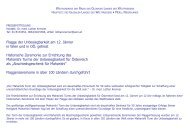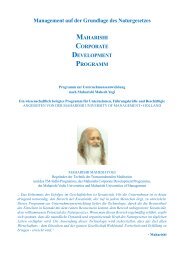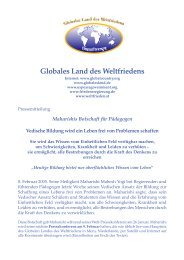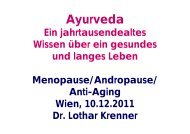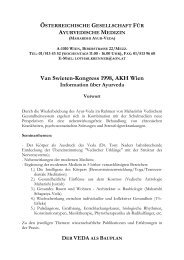Summary of Research Findings
Summary of Research Findings
Summary of Research Findings
Create successful ePaper yourself
Turn your PDF publications into a flip-book with our unique Google optimized e-Paper software.
Immunity <strong>Research</strong> (continued)<br />
4. Title<br />
Enhanced Lymphoproliferative Response, Macrophage-Mediated Tumor Cell Killing and Nitric Oxide Production<br />
After Ingestion <strong>of</strong> an Ayurvedic Drug [MAK-5].<br />
Publication<br />
Biochemical Archives, Vol. 9, pp. 365-374, 1993.<br />
Authors<br />
Kottarappat N. Dileepan, Sapna T. Varghese, Jordan C. Page, and Daniel J. Stechschulte.<br />
Conducted at<br />
Division <strong>of</strong> Allergy, Clinical Immunology and Rheumatology, Department <strong>of</strong> Medicine, University <strong>of</strong> Kansas<br />
Medical Center, Kansas City, KS 66160<br />
<strong>Summary</strong><br />
The Ayurvedic system <strong>of</strong> medicine utilizes<br />
a variety <strong>of</strong> herbal food supplements to<br />
enhance the body’s resistance to infection<br />
and disease. Maharishi Amrit Kalash Ambrosia<br />
(MAK-5) is one such commercially available<br />
food supplement. In order to evaluate its<br />
potential immunomodulatory actions, we<br />
studied the effect <strong>of</strong> ingestion <strong>of</strong> MAK-5 on<br />
lymphoproliferative response, macrophagemediated<br />
tumor cell killing, and the production<br />
<strong>of</strong> nitric oxide (NO) by macrophages.<br />
C57BL/6J mice were fed either a standard diet<br />
or that supplemented with 0.3% MAK-5, for<br />
a period <strong>of</strong> six weeks. After this time, splenic<br />
lymphocytes and peritoneal macrophages<br />
were isolated. The lymphoproliferative<br />
response was measured by [ 3 H] thymidine<br />
uptake after activation <strong>of</strong> the lymphocytes<br />
with phytohemagglutinin (PHA) or anti-CD3<br />
antibodies. Tumor cell killing by lipopolysaccharide<br />
(LPS)- or interferon (IFN)-activated macrophages was studied by an 18-hour [ 51 Cr] release assay using<br />
P815 murine mastocytoma cells as targets. Production <strong>of</strong> NO was assayed by measuring the nitrite contents in the<br />
24-hour culture supernatants <strong>of</strong> macrophage monolayers activated with IFN or a combination <strong>of</strong> LPS and IFN. In<br />
comparison to controls, lymphocytes from mice fed the MAK-5-supplemented diet exhibited significantly higher<br />
proliferative responses to PHA and anti-CD3 at all concentrations tested. The spontaneous rate <strong>of</strong> lymphocyte<br />
proliferation, measured in the absence <strong>of</strong> activators, was not enhanced by the MAK-5 diet. Peritoneal macrophages<br />
from mice maintained on the<br />
MAK-5-supplemented diet demonstrated enhanced tumor cell killing when activated with LPS, IFN, or LPS plus<br />
IFN. The production <strong>of</strong> NO by LPS- or IFN-activated macrophages from MAK-5 treated mice was significantly<br />
higher than those from controls. Neither the cytotoxicity nor the production <strong>of</strong> NO by unactivated macrophages<br />
was altered by MAK-5 supplementation. These results indicate that MAK-5 contains ingredients that can induce in<br />
vivo priming <strong>of</strong> both T-cells and macrophages for enhanced functions.<br />
(continued)<br />
63



